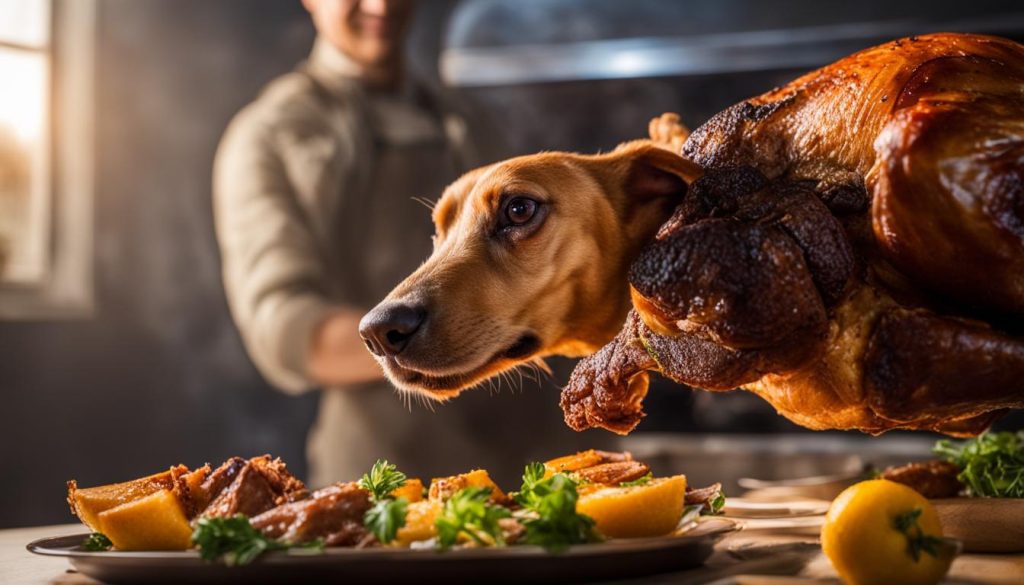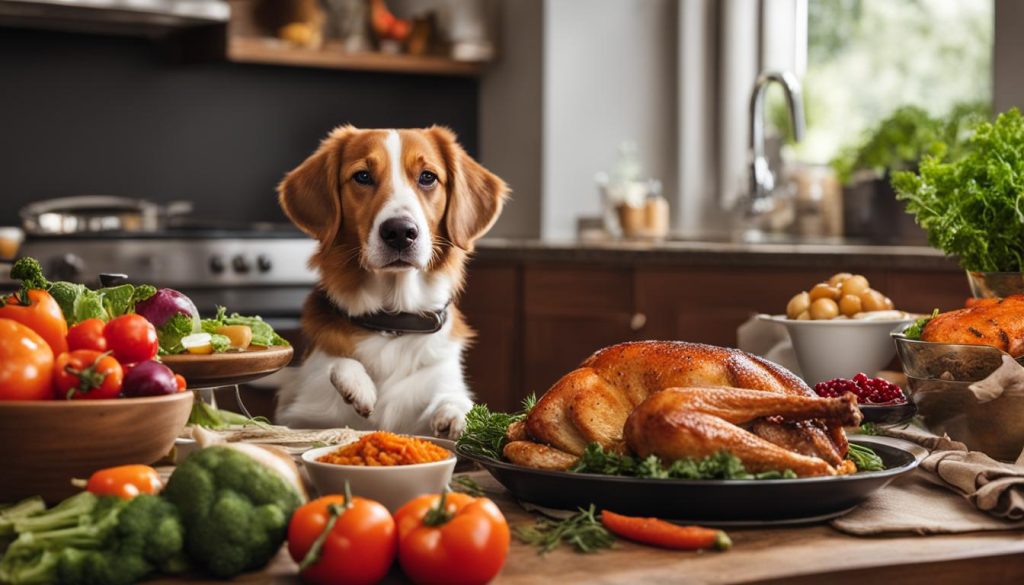As a pet lover and avid blogger on all things canine, I often encounter the question from fellow dog owners, “Can dogs eat turkey?” With the festive season always around the corner, it’s common to wonder if turkey for dogs is a culinary yes or no-go. I delved into the pet nutrition universe to bring you insights on whether turkey is safe for dogs and the potential benefits of feeding turkey to dogs. Tail wags are abound when it comes to savory treats, but let’s ensure they’re the right kind for our furry friends.
Can Dogs Eat Turkey? Yes, they occasionally can.
- Cooked, unseasoned turkey can be a protein-rich treat for dogs.
- Avoid feeding dogs turkey with skin, fat, or bones to prevent health risks.
- Ensure turkey treats for dogs are given in moderation within a balanced diet.
- High-fat or processed turkey products are harmful and should be excluded.
- Monitor your dog’s reaction to turkey as food sensitivities can occur.
Understanding Turkey as a Protein Source for Dogs
When I consider the dietary needs of my dog, protein is always at the pinnacle of the list, and turkey emerges as a high-ranking contender. Let’s delve into how incorporating turkey in a dog’s diet can be more than just a delicious treat but a formidable ally for their health.

Lean Protein Benefits in a Dog’s Diet
I’ve learned that a diet high in lean proteins like turkey can be miraculous for my dog’s muscle development and overall energy. Lean proteins from cooked turkey for dogs, especially the white meat, contain minimal calories which assist in maintaining a healthy weight while providing the much-needed protein. As an occasional treat, turkey treats for dogs can not only delight their taste buds but also contribute positively to their physique and vitality.
Abundance of Vital Nutrients in Turkey
Aside from its applaudable protein profile, turkey teems with a multitude of vital nutrients. When I include cooked turkey in my dog’s fare, I provide them with an impressive dose of Vitamin B6, Vitamin B12, niacin, and minerals such as zinc, selenium, potassium, and phosphorus. This culinary choice stands out since these components are fundamental for countless bodily functions, such as bolstering their immune system, boosting their metabolic rate, and maintaining the luster and health of their fur. Turkey in a dog’s diet, hence, is more than a mere meal—it’s a bundle of health benefits.
Can Dogs Eat Turkey?
As a pet owner myself, I’m always thinking about what foods are safe to share with my four-legged friends. When it comes to can dogs have turkey, there’s good news and important precautions to keep in mind. Dogs can indeed enjoy turkey, but there’s a “but” – it’s all about feeding turkey to dogs safely. Ensuring the meat is well-cooked is the first step; raw turkey can harbor bacteria that might lead to food poisoning in dogs. My vet constantly emphasizes that any turkey offered to Fido should be plain – no garlic, onions, or rich gravies that are often a part of our human feast, especially during holidays like Thanksgiving.
Moreover, removing the fatty skin and making sure there are no bones in the meat is crucial to prevent any digestive issues or worse, pancreatitis. Excessive fat is not a friend to your dog’s long-term health. It’s all about moderation and being mindful that while it can be a protein-packed treat, it shouldn’t replace their regular balanced meals. So, when you’re thinking about your pup’s next treat, a small piece of cooked, skinless turkey might be a healthy choice if you follow these guidelines. This not only ensures they’re getting a nutritious snack but that it’s given in a way that won’t interrupt their diet or health.

Preparation Matters: Safely Feeding Turkey to Your Dog
As a dog owner who understands the benefits of feeding turkey to dogs, I’ve learned that preparation is key to maximizing these advantages. Making sure that the turkey is served in the safest form is essential. Let me guide you through some important steps to ensure that you’re providing cooked turkey for dogs in the best way possible.
Removing Harmful Fats and Seasonings
Before I serve turkey to my furry friend, I always take the time to remove the skin and any excess fat. This is crucial because, like us, our dogs need to maintain a healthy weight, and consuming too much fat can lead to obesity and other health complications. Additionally, seasonings that we typically enjoy can be hazardous to dogs. That’s why I ensure the turkey is plain and free from garlic, onions, and other spices that are harmful to our canine companions.
The Importance of Cooking Turkey Thoroughly
Cooking turkey thoroughly is not just about avoiding a rare middle; it’s about making certain that all harmful bacteria such as Salmonella are eradicated. It’s worth mentioning that once properly cooked, the bones should be meticulously removed. It’s happened before when a friend’s dog choked on a splintered bone – it’s a serious risk we should all avoid. So, I double-check for any leftover bones to keep mealtime safe and pleasant.
Following the guidance shared here positively impacts the health and happiness of our dogs, turning a simple meal into a source of nutrition and joy. The way we prepare their food, keeping their unique dietary needs in mind, showcases our love and commitment to their well-being.
Spotting Signs of Allergic Reactions and Food Sensitivities
When I add a new treat to my dog’s diet, I understand that vigilance is key—especially when serving turkey treats for dogs. Though it’s uncommon, I know that food allergies can still present themselves. And since the question is turkey safe for dogs is often on pet owners’ minds, it’s important to be able to recognize the signs of an allergic reaction or food sensitivity.
Identifying Common Allergic Symptoms
The telltale signs of an allergic reaction in canines aren’t so different from the symptoms we humans experience. My lookout list includes incessant itching that drives my furry friend crazy, recurring ear infections that don’t seem connected to any particular cause and persistent skin infections. These symptoms are red flags that I might need to re-evaluate what’s in my dog’s bowl. If these are followed by gastrointestinal troubles like vomiting or diarrhea, especially after having turkey-based food, it’s time for me to consider that my pal could have a sensitivity to this poultry product.
When to Consult Your Veterinarian
No matter how much I think I know my dog, I’m aware that I’m no veterinarian. So, if I spot any of those worrying signs, I waste no time in getting professional advice. A veterinarian’s expertise is indispensable if my dog shows any adverse reaction to turkey treats for dogs. They can pinpoint whether it’s an allergy or another health issue at play. Plus, they offer valuable guidance on how to safely introduce turkey and other new foods into my companion’s diet without risking an allergic flare-up or other health complications.
While I enjoy sharing my favorite moments with my faithful companion, I’m constantly mindful that their health and safety come first. It’s comforting to know that with a little care and attention, turkey can be a safe and enjoyable treat for most dogs.
Countering Common Misconceptions: Is Turkey Beneficial for Dogs?
When it comes to feeding our beloved canine companions, we often look for nutritious options that complement their regular diet. Turkey has emerged as quite the topic of discussion among pet owners looking to branch out their dog’s diet. However, is the addition of turkey really beneficial for dogs, or is it simply a myth shrouded in misconceptions? Let me dive into the truths and debunk the myths surrounding turkey for dogs.
Can Turkey Actually Make Your Dog Sleepy?
The idea that turkey triggers sleepiness is not just prevalent in holiday banter, but it has also reached our dogs’ bowls. As with humans, the suggestion hinges on turkey’s tryptophan content, an amino acid that’s reputed to encourage sleep. But here’s the rub: while turkey does contain tryptophan, the levels are not significant enough to cause drowsiness in our dogs. In fact, you’d find similar quantities in other commonly fed proteins too. So, my experience tells me not to worry about turkey being a sedative treat for our energetic pups.
Comparing Turkey to Other Protein Sources in Commercial Dog Foods
When examining commercial dog foods, turkey often rises to the occasion as a commendable protein source. But what makes it different from the myriad of other options available? The answer lies in its composition. Turkey is a stellar example of lean meat, meaning it’s chock-full of benefits without overloading our companions with unnecessary fats and calories often found in richer meats.
This distinguished characteristic of turkey in a dog’s diet positions it as a viable, healthful addition — provided it’s fed properly and in moderation, of course. So, when someone asks me about the benefits of feeding turkey to dogs, I’m quick to point out its favorable nutritional profile, especially when trying to maintain a well-rounded diet for our four-legged friends.
FAQ
Can Dogs Eat Turkey?
Yes, dogs can eat turkey if it is plain and properly prepared. Cooked turkey can be a beneficial treat for dogs, offering a good source of protein and other nutrients when given in moderation.
What Are the Benefits of Feeding Turkey to Dogs?
Turkey is a lean source of protein that can help with muscle development and provides essential nutrients like B vitamins, zinc, and selenium which are important for your dog’s overall health.
What Should I Consider When Adding Turkey to My Dog’s Diet?
You should ensure the turkey is cooked thoroughly, without added fats or seasonings, and remove all bones before feeding it to your dog to prevent any health risks.
Are There Any Parts of Turkey I Should Avoid Feeding to My Dog?
Yes, you should avoid feeding turkey skin, processed turkey products like lunch meats, smoked turkey, and cooked bones, as these can pose health risks including digestive issues and obstructions.
How Can I Safely Prepare Cooked Turkey for My Dog?
To prepare cooked turkey safely for your dog, remove all the skin and visible fat, ensure the turkey is fully cooked, and avoid any seasonings or ingredients that are toxic to dogs.
What Are Some Common Signs of Food Allergies in Dogs?
Signs of food allergies in dogs can include itching, recurrent ear infections, skin infections, and gastrointestinal problems like vomiting or diarrhea.
When Should I Consult a Veterinarian Regarding My Dog’s Reaction to Turkey?
You should consult a veterinarian if you notice signs of an allergic reaction or if your dog exhibits any adverse symptoms after eating turkey.
Will Feeding My Dog Turkey Make Them Sleepy?
No, the myth that turkey causes sleepiness due to tryptophan is unfounded. Turkey contains only a small amount of this amino acid, and it is unlikely to have a significant impact on your dog’s energy levels.
How Does Turkey Compare to Other Proteins in Commercial Dog Foods?
Turkey is often favored in commercial dog foods for its lean quality and nutrient-rich profile, offering high levels of protein with fewer calories and fats compared to darker meats. It’s a suitable occasional addition to a balanced diet for dogs.






